#african languages
Photo
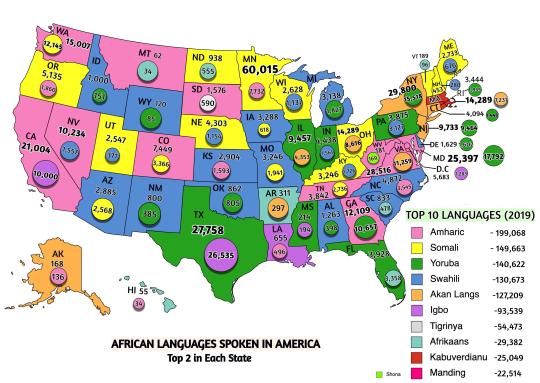
Top 2 African languages spoken in each US state
231 notes
·
View notes
Text




The language emerged from contact between French settlers and enslaved Africans during the Atlantic slave trade in the French colony of Saint-Domingue (now Haiti) in the 17th and 18th centuries.
Although its vocabulary largely derives from 18th-century French, its grammar is that of a West African Volta-Congo language branch, particularly the Fongbe and Igbo languages. It also has influences from Spanish, English, Portuguese, Taino, and other West African languages.
It is not mutually intelligible with standard French, and has its own distinctive grammar. Haitians are the largest community in the world speaking a modern creole language, according to some sources.
However, this is disputable, as Nigerian Pidgin, an English-based Creole language, is attested by some sources to have a larger number of speakers than that of Haitian Creole and other French-based Creole languages, particularly if non-native speakers are included.

#creole#haitian creole#nigerian pidgin#creole language#taino#spanish#english#african languages#congo#miami#zoe pound#west african#atlantic slave trade#french#african#afrakan#kemetic dreams#africans#brown skin#brownskin#afrakans#african culture
68 notes
·
View notes
Text
Today I learned (from a Jacob Geller video, but here's an article, too) that Al Qaida went on a rampage committing arson, destroying ancient scrolls and manuscripts (specifically in Mali). A librarian who was preserving a collection of PRICELESS manuscripts in Timbuktu knew that Al Qaida would be coming to their library sooner or later, so over the course of six months with the help of several volunteers, they would transport around 200,000 books.
(Some of the documents & books in the library didn't make it out/were destroyed around January 2013) In the beginning they drove 600 mile (checkpoint filled) round trip again and again to each house that has volunteered to put their life on the line to save the books.
Eventually, that method became impossible, and he discovered he (and the other volunteers) only have one choice: FLOATING THE REST OF THE BOOKS DOWN THE NIGER RIVER. BOOKS. DOWN A RIVER. Seven Hundred Ninety One (791) TRUNKS/"footlockers" of BOOKS were sent down a river. You want to know how many made it? How many were recovered? ALL SEVEN HUNDRED NINETY ONE TRUNKS WORTH.
These books are literal relics. "Some date back to the 13th Century, and have survived more than 700 years." Bro, you are awesome, but you are going to give me a heart attack. Anyway, this some wild history and the art in these manuscripts is beautiful.

#Mali#Timbuktu#history#world history#african history#al qaeda#books#manuscripts#documents#islamic culture#art#tumblr history#west africa#jacob geller#video essay#article#recent history#calligraphy#african languages#13th century#ancient history#ancient art
107 notes
·
View notes
Text
girls don’t want boys, girls want Xhosa for English speakers on Duolingo, launching October 2038
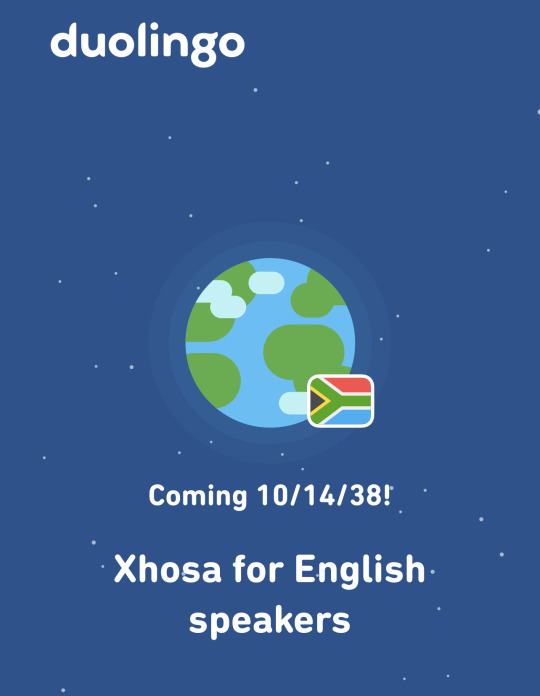
#duolingo#duolingo memes#xhosa#african languages#langblr#language#language blog#languageblr#language meme#language memes#linguistics#linguistics humor#language learning#english#linguistics memes#linguistics blog#lingblr#studyblr#language lover#lingblog#linguistics tumblr#languages#linguistics jokes
344 notes
·
View notes
Text
How to Learn an African Language: Resources
I have been working on a database of resources for learners of African languages. You do not to search manually to find the best resources anymore—this site does it for you.
It includes material for beginner, intermediate and advanced learners.
Already has a wide variety of languages for you to explore—from major languages such as Amharic, Igbo and Swahili to smaller languages such as Basaa, Coptic and Moba.
You can filter by language, type of resource, rating and level.
Continually updated with more resources every day.
Honest and unbiased ratings and reviews; no affiliate links.
#langblr#language#languages#african languages#language learning#language resources#learning#studyblr#study blog#learn a language#resources
482 notes
·
View notes
Text

On this Puntland day, let’s celebrate the Somali script invented by Osman Yusuf Kenedid, son of the Sultan of Hobyo.
𐒖𐒐𐒐𐒗 𐒔𐒖 𐒚 𐒒𐒖𐒄𐒖𐒇𐒘𐒘𐒈𐒂𐒙.
24 notes
·
View notes
Text

Locatives.
Gbe ɔ ngɛ tso ɔ sisi. - The dog is under the tree.
Gbe= dog
ɔ = definitive article
ngɛ = at
tso = tree
sisi = under
source - Regina Oforeiwah
#dangme#learn dangme#gadangme#dangme language#african language#african languages#west african language#west african languages#language learner#language learning#learning rare languages
1 note
·
View note
Link
3 notes
·
View notes
Text
The mind-boggling complexities of Africa's 1,500 languages were clarified by Stanford University's great linguist Joseph Greenberg, who recognized that all those languages fall into just five families (see Figure 19.2 for their distribution). Readers accustomed to thinking of linguistics as dull and technical may be surprised to learn what fascinating contributions Figure 19.2 makes to our understanding of African history. (...) Concealed at the top of Figure 19.2 is our first surprise, a big shock for Eurocentric believers in the superiority of so-called Western civilization.
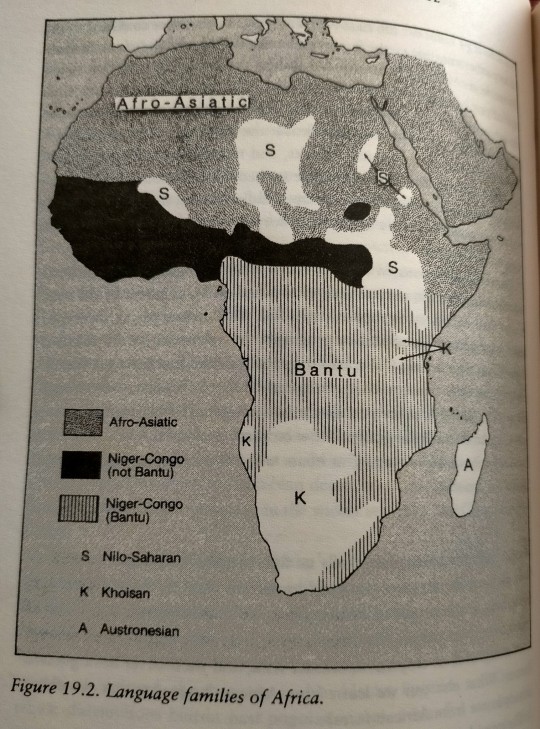
The next surprise in Figure 19.2 is a seeming detail on which I didn't comment when I just told you that distinct peoples tend to have distinct languages. (...) The fragmented distribution of Nilo-Saharan languages in Figure 19.2 similarly implies that many speakers of those languages have been engulfed by speakers of Afroasiatic or Niger-Congo languages. (...) If you look again at Figure 19.2, you'll see that the Niger-Congo language family is distributed all over West Africa and most of subequatorial Africa, apparently giving no clue as to where within that enormous range the family originated.
"Guns, Germs and Steel: A Short History of Everybody for the Last 13,000 Years" - Jared Diamond
#book quotes#guns germs and steel#jared diamond#nonfiction#language#stanford university#joseph greenberg#linguistics#african history#bantu#niger congo#afroasiatic#african languages
3 notes
·
View notes
Link
#kikongo#lari#laari#ladi#laadi#congo#république du congo#republic of congo#centralafrica#language#langue#apprendre#learn#bantu#african languages#africa#afrique
8 notes
·
View notes
Text

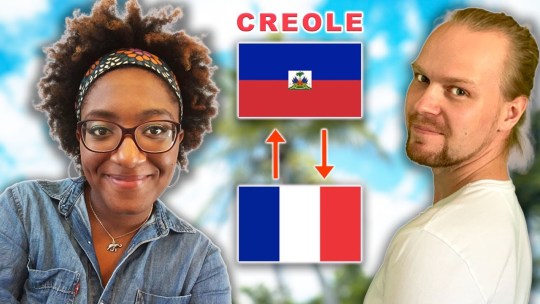
Haitian Creole contains elements from both the Romance group of Indo-European languages through its superstrate, French, as well as influences from African languages. There are many theories on the formation of the Haitian Creole language.
One theory estimates that Haitian Creole developed between 1680 and 1740. During the 17th century, French and Spanish colonizers produced tobacco, cotton, and sugar cane on the island. Throughout this period, the population was made of roughly equal numbers of engagés (white workers), gens de couleur libres (free people of colour) and slaves. The economy shifted more decisively into sugar production about 1690, just before the French colony of Saint-Domingue was officially recognized in 1697. The sugar crops needed a much larger labor force, which led to an increase in slave trafficking . In the 18th century an estimated 800,000 West Africans were enslaved and brought to Saint-Domingue. As the slave population increased, the proportion of French-speaking colonists decreased.
Many African slaves in the colony had come from Niger-Congo-speaking territory, and particularly speakers of Kwa languages, such as Gbe from West Africa and the Central Tano languages, and Bantu languages from Central Africa. Singler suggests that the number of Bantu speakers decreased while the number of Kwa speakers increased, with Gbe being the most dominant group. The first fifty years of Saint‑Domingue's sugar boom coincided with emergent Gbe predominance in the French Caribbean. In the interval during which Singler hypothesizes the language evolved, the Gbe population was around 50% of the kidnapped enslaved population.
Classical French (français classique) and langues d'oïl (Norman, Poitevin and Saintongeais dialects, Gallo and Picard) were spoken during the 17th and 18th centuries in Saint‑Domingue, as well as in New France and French West Africa. Slaves lacked a common means of communication and as a result would try to learn French to communicate with one another, though most were denied a formal education. With the constant trafficking and enslavement of Africans, the language became increasingly distinct from French. The language was also picked up by other members of the community and became used by the majority of those born in what is now Haiti.

#african#kemetic dreams#afrakan#africans#brownskin#brown skin#african culture#african languages#french#west africa#norman#classical french#gallo
27 notes
·
View notes
Text
Duolingo Sucks, Now What?: A Guide
Now that the quality of Duolingo has fallen (even more) due to AI and people are more willing to make the jump here are just some alternative apps and what languages they have:
"I just want an identical experience to DL"
Busuu (Languages: Spanish, Japanese, French, English, German, Dutch, Italian, Portuguese, Chinese, Polish, Turkish, Russian, Arabic, Korean)
"I want a good audio-based app"
Language Transfer (Languages: French, Swahili, Italian, Greek, German, Turkish, Arabic, Spanish, English for Spanish Speakers)
"I want a good audio-based app and money's no object"
Pimsleur (Literally so many languages)
Glossika (Also a lot of languages, but minority languages are free)
*anecdote: I borrowed my brother's Japanese Pimsleur CD as a kid and I still remember how to say the weather is nice over a decade later. You can find the CDs at libraries and "other" places I'm sure.
"I have a pretty neat library card"
Mango (Languages: So many and the endangered/Indigenous courses are free even if you don't have a library that has a partnership with Mango)
Transparent Language: (Languages: THE MOST! Also the one that has the widest variety of African languages! Perhaps the most diverse in ESL and learning a foreign language not in English)
"I want SRS flashcards and have an android"
AnkiDroid: (Theoretically all languages, pre-made decks can be found easily)
"I want SRS flashcards and I have an iphone"
AnkiApp: It's almost as good as AnkiDroid and free compared to the official Anki app for iphone
"I don't mind ads and just want to learn Korean"
lingory
"I want an app made for Mandarin that's BETTER than DL and has multiple languages to learn Mandarin in"
ChineseSkill (You can use their older version of the course for free)
"I don't like any of these apps you mentioned already, give me one more"
Bunpo: (Languages: Japanese, Spanish, French, German, Korean, and Mandarin)
#EDIT: Added a great resource for ESL and African languages that weren't found elsewhere#I do NOT recommend memrise and will talk about it another day but#langblr#duolingo#duo#language learning#language learning apps#mandarinblr#resource#reference
68K notes
·
View notes
Text
Exploring the Rich Linguistic Heritage of Kikongo and Kituba Languages in the Kongo Kingdom
Uncovering the Secrets of the Kikongo Language and People
Located in the heart of Central Africa, the Kikongo language has a rich cultural heritage that has been passed down through the centuries. This ancient language spoken by the Bakongo people provides fascinating insight into the region’s history, traditions and way of life. In this article, we delve into the fascinating world of the…
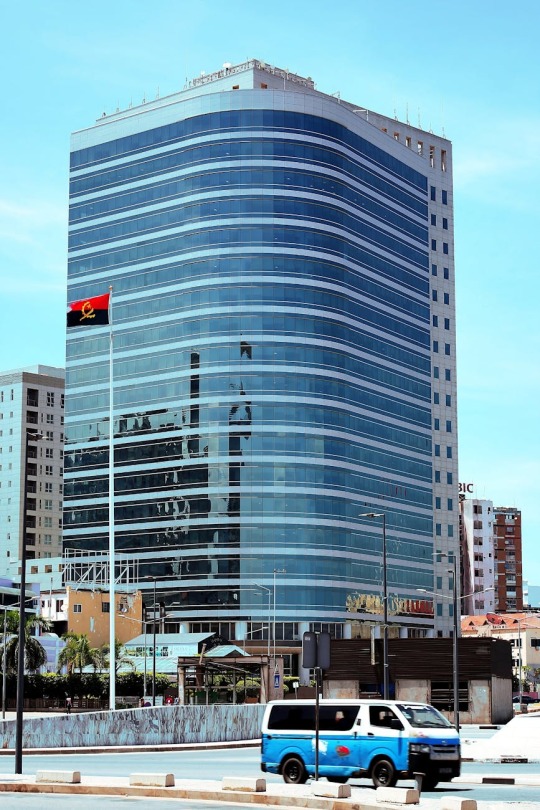
View On WordPress
#African Languages#Bakongo people#Bantu languages#Cultural Heritage#inclusivity#Interpretation Services#Kikongo language#Kongo Kingdom#Language Preservation#LanguageXS
0 notes
Text
In 2012 UNESCO predicted that my language will die in 2025
However, many dedicated activists have been working to counter and reverse the trend of parents deliberately not passing on the Igbo language to their children. While Igbo still is not at the level that it should be at, it is heartening to see that it is still alive and is still one of Africa’s major languages.
Some people were displeased with UNESCO but it is not UNESCO’s fault that so many of us are ashamed of who we are and desperately want to be as white as possible.
“However, we’re a colonised people. We hold everything we do to the standard of the white man, so our food, language, and culture have become gentrified. Our children learn Chinese, Spanish and other foreign languages, but there’s a need to reorient our way of life and the value of our languages. We can’t continue to be embarrassed about ourselves. At some point, our culture will become revived and fashionable again.”
#igbo language#igbo#Asụsụ Igbo#langblr#multilingualism#language#languages#multilingual#lingblr#language reclamation#indigenous languages#language learning#african languages
217 notes
·
View notes
Text
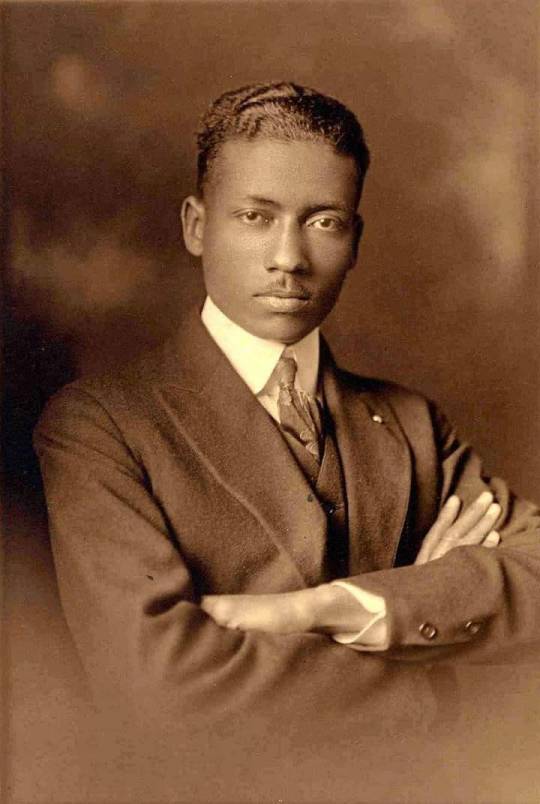
LORENZO DOW TURNER (1890 –1972) was an academic and linguist who conducted seminal research on the Gullah language of coastal South Carolina and Georgia. He earned a master's degree from Harvard and a Ph.D. from the Univ. of Chicago. He taught at Howard Univ. (1917-1928) and Fisk Univ. (1929 – 1946) and traveled West Africa, identifying over 300 (Mende, Vai, Fulani) Gullah loanwords and 4,000 personal names. He published his findings in his book “Africanisms in the Gullah Dialect (1949).
His work also connected the (ring) Shout to the Islamic 'shawt' and the Tassawuf ceremony. The Shout is based largely on Kongo and other African cosmological systems and rituals; the songs tend to evoke Christian Biblical imagery and themes; but the mysticism therein is connected to Islam.
SOURCE: Afrofuturist Abolitionists of America
9 notes
·
View notes
Video
youtube
SHOCKING SIMILARITIES BETWEEN SHONA AND KISWAHILI: ZIMBABWEANS KENYANS TANZANIANS AND CONGOLESE COME
#youtube#Swahili#Shona#African Languages#Bantou#BAntu LAnguages#East Africa#Central Africa#Southern Africa#Same Root#LAnguages
0 notes